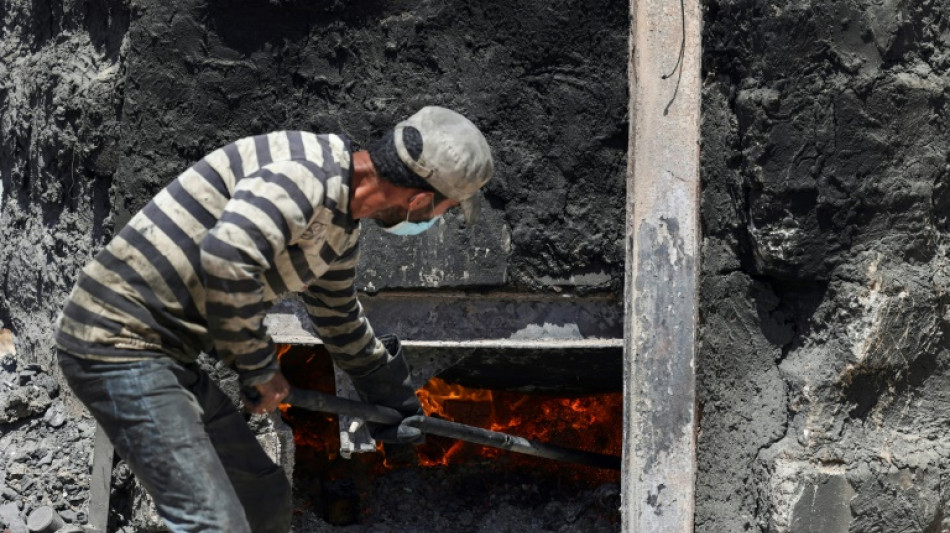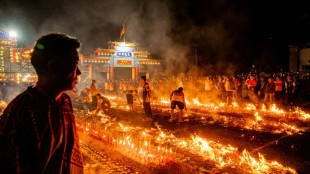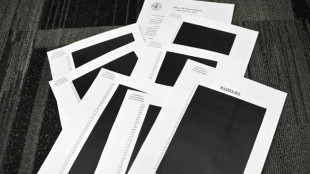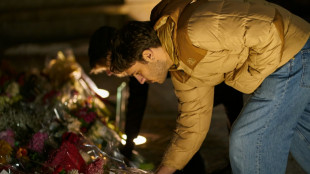
-
 England 'flat' as Crawley admits Australia a better side
England 'flat' as Crawley admits Australia a better side
-
Australia four wickets from Ashes glory as England cling on

-
 Beetles block mining of Europe's biggest rare earths deposit
Beetles block mining of Europe's biggest rare earths deposit
-
French culture boss accused of mass drinks spiking to humiliate women

-
 NBA champions Thunder suffer rare loss to Timberwolves
NBA champions Thunder suffer rare loss to Timberwolves
-
Burning effigy, bamboo crafts at once-a-decade Hong Kong festival

-
 Joshua knocks out Paul to win Netflix boxing bout
Joshua knocks out Paul to win Netflix boxing bout
-
Dogged Hodge ton sees West Indies save follow-on against New Zealand

-
 England dig in as they chase a record 435 to keep Ashes alive
England dig in as they chase a record 435 to keep Ashes alive
-
Wembanyama 26-point bench cameo takes Spurs to Hawks win

-
 Hodge edges towards century as West Indies 310-4, trail by 265
Hodge edges towards century as West Indies 310-4, trail by 265
-
US Afghans in limbo after Washington soldier attack

-
 England lose Duckett in chase of record 435 to keep Ashes alive
England lose Duckett in chase of record 435 to keep Ashes alive
-
Australia all out for 349, set England 435 to win 3rd Ashes Test

-
 US strikes over 70 IS targets in Syria after attack on troops
US strikes over 70 IS targets in Syria after attack on troops
-
Australian lifeguards fall silent for Bondi Beach victims

-
 Trump's name added to Kennedy Center facade, a day after change
Trump's name added to Kennedy Center facade, a day after change
-
West Indies 206-2, trail by 369, after Duffy's double strike

-
 US strikes Islamic State group in Syria after deadly attack on troops
US strikes Islamic State group in Syria after deadly attack on troops
-
Epstein files opened: famous faces, many blacked-out pages

-
 Ravens face 'special' Patriots clash as playoffs come into focus
Ravens face 'special' Patriots clash as playoffs come into focus
-
Newly released Epstein files: what we know

-
 Musk wins US court appeal of $56 bn Tesla pay package
Musk wins US court appeal of $56 bn Tesla pay package
-
US judge voids murder conviction in Jam Master Jay killing

-
 Trump doesn't rule out war with Venezuela
Trump doesn't rule out war with Venezuela
-
Haller, Aouar out of AFCON, Zambia coach drama

-
 Nasdaq rallies again while yen falls despite BOJ rate hike
Nasdaq rallies again while yen falls despite BOJ rate hike
-
Bologna win shoot-out with Inter to reach Italian Super Cup final

-
 Brandt and Beier send Dortmund second in Bundesliga
Brandt and Beier send Dortmund second in Bundesliga
-
Trump administration begins release of Epstein files

-
 UN Security Council votes to extend DR Congo mission by one year
UN Security Council votes to extend DR Congo mission by one year
-
Family of Angels pitcher, club settle case over 2019 death

-
 US university killer's mystery motive sought after suicide
US university killer's mystery motive sought after suicide
-
Rubio says won't force deal on Ukraine as Europeans join Miami talks

-
 Burkinabe teen behind viral French 'coup' video has no regrets
Burkinabe teen behind viral French 'coup' video has no regrets
-
Brazil court rejects new Bolsonaro appeal against coup conviction

-
 Three-time Grand Slam winner Wawrinka to retire in 2026
Three-time Grand Slam winner Wawrinka to retire in 2026
-
Man Utd can fight for Premier League title in next few years: Amorim

-
 Pandya blitz powers India to T20 series win over South Africa
Pandya blitz powers India to T20 series win over South Africa
-
Misinformation complicated Brown University shooting probe: police

-
 IMF approves $206 mn aid to Sri Lanka after Cyclone Ditwah
IMF approves $206 mn aid to Sri Lanka after Cyclone Ditwah
-
US halts green card lottery after MIT professor, Brown University killings

-
 Stocks advance as markets cheer weak inflation
Stocks advance as markets cheer weak inflation
-
Emery says rising expectations driving red-hot Villa

-
 Three killed in Taipei metro attacks, suspect dead
Three killed in Taipei metro attacks, suspect dead
-
Seven Colombian soldiers killed in guerrilla attack: army

-
 Amorim takes aim at Man Utd youth stars over 'entitlement'
Amorim takes aim at Man Utd youth stars over 'entitlement'
-
Mercosur meets in Brazil, EU eyes January 12 trade deal

-
 US Fed official says no urgency to cut rates, flags distorted data
US Fed official says no urgency to cut rates, flags distorted data
-
Rome to charge visitors for access to Trevi Fountain


In risky recyling venture, Gazans burn plastic for fuel
Living in one of the poorest parts of the Middle East and facing some of the region's highest fuel costs, Palestinians in Gaza are burning plastic to make affordable diesel.
It's an economic and practical solution in a territory blockaded by Israel for 15 years, but one which poses serious environmental and health risks, experts say.
Standing before rusty metal machinery and fuel containers, Mahmoud al-Kafarneh described how he and his brothers came up with their plastic recycling project.
"We started experimenting to implement the project in 2018, through searching the internet," he told AFP, at the site in the Jabalia area of northern Gaza.
"We failed a few times; after eight months we succeeded in extracting the fuel."
The distilling setup features a series of crude-looking tanks and connecting pipes set up outside on the dirt.
The process starts with the burning of wood in a furnace below a large mud-covered tank holding up to 1.5 tonnes (tons) of shredded plastic. When the plastic melts, the vapours flow through a pipe into a water tank where they cool and drip as fuel into containers, ready to be sold.
Black-grey smoke pours from several pipes extending above the furnace and the tank holding the plastic.
Only a few of the workers wear face masks and gloves as they melt bagfuls of shredded plastic. Their clothing is stained black.
Kafarneh said no-one has experienced health problems since starting work at the site, which sits beside olive trees and away from residential buildings.
"We follow all safety procedures at work", he said.
But Ahmed Hillis, director of Gaza's National Institute for the Environment and Development, fears an environmental catastrophe from this unregulated industry.
"The method used is rudimentary and very harmful to the workers," mainly because they inhale toxic fumes, he told AFP.
Burning plastic releases dioxins, mercury and other toxic gases which pose "a threat to vegetation, human and animal health", according to the United Nations Environment Programme.
Hillis adds another danger of burning plastic, which is derived from petroleum hydrocarbons.
The tank is "a time bomb because it could explode" from the heat, he says.
In Gaza, where exchanges of fire between Palestinian militants and Israel for three days earlier this month killed at least 49 Palestinians, health risks are outweighed by economic reality.
- 'Same quality' -
Kafarneh, 25, said he would ideally upgrade their kit to a safer tank operated by electricity.
"But it's unavailable due to the Israeli blockade," he said.
Since 2007, when the Islamist movement Hamas seized control of the Gaza Strip, Israel has severely restricted the flow of people and goods in and out of the coastal enclave where 2.3 million people live.
The territory is increasingly impoverished.
Unemployment has hit 47 percent and the average daily wage is around 60 shekels ($18), according to the Palestinian Central Bureau of Statistics.
Petrol delivered from Israel shot up to eight shekels ($2.40) a litre in Gaza, after Russia's invasion of Ukraine sent global fuel prices spiking, before a pullback.
That sent demand soaring for Kafarneh's fuel, with fishermen and farmers among the top customers.
At the portside in Gaza City, Abd al-Muti al-Habil is using a hose to fill the tank of his fishing boat.
"We use this diesel because it's half the cost of the Israeli equivalent," he said.
"There are no disadvantages. It's the same quality, it doesn't affect the motor and it's working efficiently."
The only problem for Habil is the shortage of supply, with around 10 boats currently using diesel made from recycled plastic.
"Unfortunately the quantities are not enough. I barely get 500 litres (132 gallons) every two days," he said.
Habil's boat burns through 900 litres (237 gallons) of fuel during 12 hours at sea, quantities which are unaffordable if he relies solely on imported fuel.
One tankful of plastic can produce 1,000 litres (264 gallons) of fuel every 12-14 hours, but Kafarneh's team must wait eight hours for the equipment to cool before they can restart the process.
The amount produced also depends on the availability of raw materials.
At a sorting facility near the distilling site, six men are combing through a towering heap of baskets, bowls, buckets and other plastic waste.
"We get the plastic from workers who collect it from the street. We buy it from them, then we separate it and grind it through a special machine," said Imad Hamed, whose hands are stained black from the work.
With the grinder relying on electricity, Hamed said they are frequently interrupted by Gaza's chronic power cuts.
"We have to work at night sometimes, to coincide with the availability of electricity," he said.
I.Meyer--BTB
